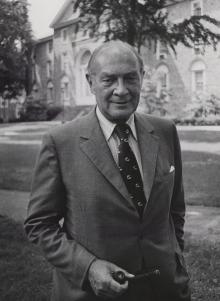- Home
- Archival Material
- College History Projects
- Subject-Based Digital Projects
Howard Lane Rubendall (1910-1991)

Howard Rubendall was born on May 14, 1910 in Williamstown, Pennsylvania to Charles W. and Lottie Row Rubendall. He grew up in the small ferry town of Millersburg near Harrisburg and attended Dickinson College in Carlisle, Pennsylvania from which he graduated in 1931. While at Dickinson he was a member of Phi Kappa Sigma fraternity as well as the Omicron Delta Kappa honor society.
Following graduation Rubendall spent three years teaching at the American University in Cairo, Egypt. In 1935, he resumed his studies at the Union Theological Seminary, from which he received his B.D. in 1937. He then began to work in the position of chaplain and chairman of the department of religion at the Hill School until 1941 when he became the pastor of the First Presbyterian Church in Albany, New York. In 1944, he served as the president of the Northfield Schools, which included the dual positions as the headmaster of Mount Hermon School for Boys and president of Northfield School for Girls in Northfield, Massachusetts. He served in this capacity for seventeen years.
On July 1, 1961, he took the office of the twenty-fourth president of Dickinson College at a time which can only be termed as difficult. Faculty morale was extremely low, with the College under censure by the Association of University Professors for violation of acceptable standards of academic freedom and tenure. At the same time, the Middle States Association of Colleges was witholding re-accreditation pending the institution of some minimal academic and administrative reforms. In addition, the long relationship the College had with the Methodist Church was under increasing strain as society became more secular.
Rubendall, known to all as "Bud" since his undergraduate days, could therefore do nothing but embark upon a major reformation of College policies. He oversaw the removal of censure and implemented the reforms recommended by the Middle States evaluators, thoroughly revising the curriculum. New departments were created in geology, music, and the fine arts; innovations such as independent studies, honors projects, and the double and self-developed major all became possible. Student social life also began to change, starting with the College's definitive break with the Methodist Church over the campus social drinking policy. Rubendall reviewed the policy and in 1963 finally conceded that social drinking by students over the age of 21 was a matter of legal choice and therefore acceptable. At the same time, the fraternities were held to a higher standard of self-government and the College's stronger enforcement of clearer, simpler, and agreed upon rules. Beginning in 1970, student voices were also admitted to the administration, as the evolving system of all-College committees allowed for the election of student representatives. Rubendall's constant communication with student leaders, and the general level of trust and affection in which he was held in the campus community, allowed Dickinson to avoid much of the turmoil experienced on other college campuses during the time of Vietnam and Cambodia.
Rubendall's presidency marked a period of physical growth for the College. The value of the physical plant tripled to more than $25 million and twenty new facilities were added. The completion of Adams Hall as another dormitory for women in 1963 was the first, followed by the construction of two new dormitories for men, Malcolm Hall and Witwer Hall, three years later. The Dana Biology Building, built to replace Baird Hall which had been razed for the dormitory construction, was completed in 1966, and the new Boyd Lee Spahr Library was finished a year later. The Holland Union Building was completed in 1969, built upon the former site of private homes and fraternity houses along College Street. The ten fraternities had sold their off-campus houses to the College in exchange for housing in the newly-constructed, college-owned "Fraternity Quadrangle." As facilities were expanding, the student population also climbed from just over 1,000 in 1961 to 1,671 in 1975; accordingly, the number of faculty positions grew as well.
At the mid-winter meeting of the Board of Trustees in January 1973, Rubendall announced his intention to retire, effective on June 30, 1975. Some commentary may be made that the College during his tenure moved to far and too fast in certain areas for the full potentials to be reached, but the transformation of the appearance and the temperament of the College and its members in the Rubendall years is undeniable. His popularity with the student body is now legendary. He retired to Naples, Florida with his wife, Carolyn Dennett of Fort Madison, Iowa, whom he met while he was a seminarian and married in April 1935. They had two daughters, Linda and Suzanne. On April 13, 1991, Rubendall died in his home from respiratory failure resulting from cancer.
Date of Post:
2005
College Relationship:
Alumnus/Alumna Class Year:
President - Years of Service:
1961-1975
Trustee - Years of Service:
1961-1975
Honorary Degree - Year:
1945